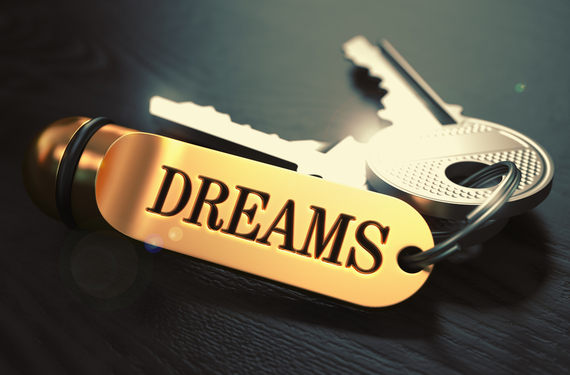By Dr. Angel Morgan via DreamsCloud
There are many different kinds of dreams ranging from ordinary to extraordinary (3). Our ordinary dreams tend to play out "dramas" regarding whatever concerns us the most at the time of the dream. Around Thanksgiving time, that can often include subjects such as travel plans, food, gatherings, and all the dynamics of our relationships with friends, family, and loved ones.
As much as the Thanksgiving holiday promises love and joy, it can also provide interpersonal challenges that aren't always that simple or easy. There are more than a few ways that dreams can help turn a festival of histrionics, into a smorgasbord of delight!
While it's been said that animals dream to aid in survival from predators, we as humans often dream to aid in our survival from the predatory tensions of our social experiences (4). By going to sleep each night, we have the opportunity to metaphorically process our feelings from the past, while exploring new material that is also woven into the dream landscape (1). This new information can potentially be very inspiring to the decisions we make in our waking life.
Just as our waking experiences affect dream consciousness, dream experiences affect our waking consciousness as well. Add a dash of dream education, and you may find yourself weaving a beautiful tapestry and providing yourself with an abundant feast for the soul! The better we feel from within our dream worlds, the more likely we are to become more social, compassionate, and selfless with others. Unfortunately, dreams are instead often shaken off or forgotten, and the opportunity to become more self-aware is traded in for the discomfort of being slightly out-of-touch with how we really feel and who we really are.
Although it's true that to a great extent we leave the social support existing in waking life and are left to our own devices in dreams (4), it's also true that the choices we make socially in one realm, can have direct impact on the other, and vice versa.
For example, if I have an argument with a friend and dream about her later that night, she may continue to oppose and argue with me in my dream. At that point, I have a choice to be social or anti-social. The anti-social choice would be to ignore the dream, and continue to be unclear about my true feelings about my friend, her behavior, and our disagreement.
If I choose to explore my dream, and dialogue with the part of myself cloaked in the image of my friend, I become more equipped to approach her the next day. At that time, I can communicate with a more social gesture than I would have been capable of while possessing the inner discomfort I had associated with her image. Perhaps there was something she had said or done to remind me of a painful experience in my own biography. Dream exploration and inner dialoguing helps us differentiate previous biographical issues from present social ones that need to be addressed.
The self-discipline of becoming more socially responsible in this way starts with deciding to learn more about dreams. It requires insight into the discernment between dreaming and waking relationships. In essence, if we're responsible to work on an inner social development that supports us in our dream world while sleeping, we can become more supportive of others socially while awake.
Lucid dreaming is of course another way of sorting through relationships in this way, but re-dreaming and dialoguing with dream characters in daydreams is also a valuable and effective course of action for those just starting out.
When we're lucky, we might even find ourselves enjoying abundant varieties of food at a literal "feast" in our dreams. But it doesn't stop there!
The revolving door of dreaming and waking takes us right back to reflecting on the meaning of food and feasts in dreams, which is connected in sometimes obvious -- sometimes cryptic -- ways with waking life experience. If I dream about celebrations or gatherings where people are eating healthy foods, I am usually feeling pretty nourished in my waking life, but which came first, was it the dream of nourishment, or the feeling of nourishment? The chicken or the egg?
I once dreamed about a billboard that showed a candy bar labeled, "Believe Chocolate." Underneath, the billboard read, "Do not eat this or else you will suffer." Next to the billboard, my friend and I were eating chocolate.
At the time, I interpreted my dream to mean that I was some kind of rebel (continuing to eat chocolate anyway) and not vulnerable to propaganda that told me what to do (the billboard). It was a convenient interpretation, and may have served me for a time.
But when I learned that I can no longer eat chocolate for my health in waking life, I read the dream very differently -- I saw that the billboard may have been my dream mind trying to get my attention and deliver a very literal message. An International Association for the Study of Dreams colleague Ed Kellogg, Ph.D. calls this sort of communication in dreams a "Dreamatarian" diet (2).
This year, at the end of whatever your Thanksgiving feast may look like, what will your dreams say about food for your body, and nourishment for your soul?
DreamsCloud is the world's leading online dream resource, with an interactive database of more than 1.8 million dreams. Offering a 360-degree approach to dreaming -- including a real-time global dream map, dream journaling/sharing tools and the largest group of professional dream reflectors -- DreamsCloud empowers users to better understand their dreams and improve their waking lives. They offer a free app for iOS called DreamSphere and curate one of the largest available online dream dictionaries.
Blog author Angel Morgan, Ph.D., completed the Dream Studies and Creativity Studies programs at Saybrook University. Her research can be found on academia.edu. Dr. Morgan also oversees the experienced dream reflectors at DreamsCloud, providing feedback and insight for dreams submitted by users worldwide.
References
(1) Hartmann, E. (1998). Dreams and nightmares: The new theory on the origin and
meaning of dreams. New York: Plenum.
(2) Kellogg., E. (2007, September 23). Mind-body healing through dreamwork. In International Association for the Study of Dreams. Retrieved from http://www.asdreams.org/psi2007/papers/edkellogg.htm
(3) Krippner, S. Bogzaran, F., & de Carvalho, A. P. (2002). Extraordinary dreams and how to work with them. New York: State University of New York Press.
(4) Ullman, M. (1999). Dreaming consciousness: More than a bit player in the search for answers to the mind/body problem. Journal of Scientific Exploration, 13, 91-112.



